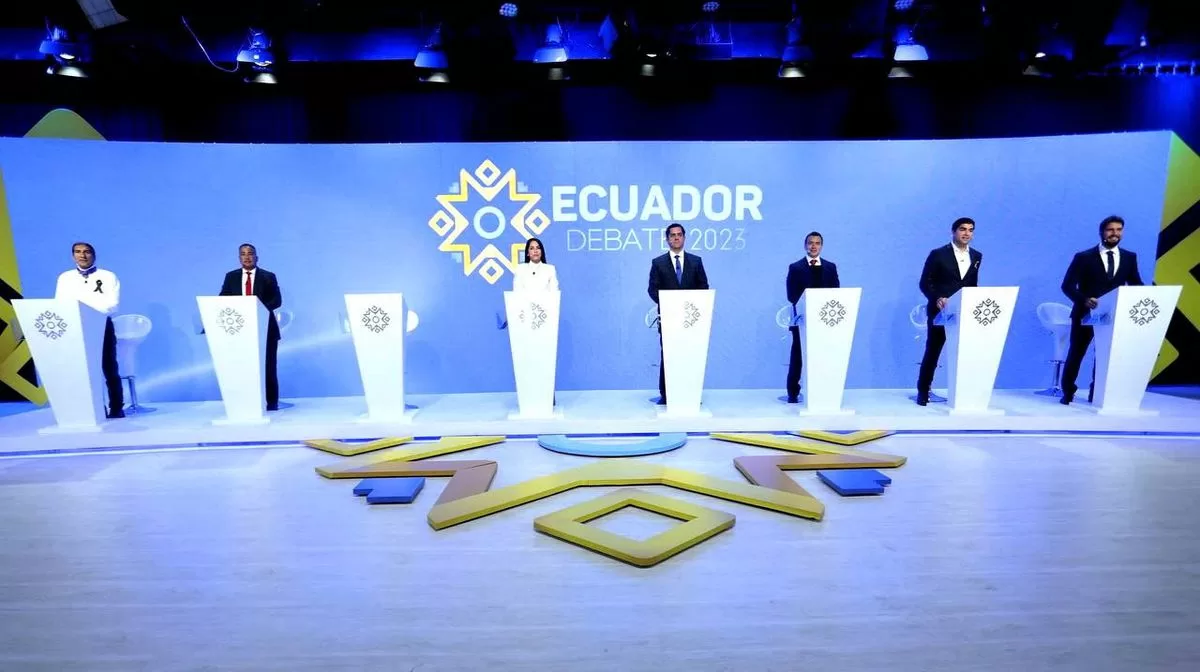Ecuador’s presidential debate took place on Sunday under complex security conditions, with an empty lectern for the murdered candidate, Fernando Villavicencio, and no opportunity to confront ideas. The rigid debate format, established by a committee made up of the National Electoral Council, established five axes of topics with pre-established questions that the seven candidates had to answer in one minute, and then forced the applicants to ask each other, without the option of counter ideas. When that happened, the opponents were interrupted by the moderators to avoid an “attack”.
Violence was the center of the interventions of the candidates: a heavy hand, retaking control of the prisons, equipping and training the public force, and an intelligence system, were the coincidences of the applicants amid constant interruptions for not conform to the discussion format. It failed to explain how they will do it and where the funds will come from to finance their projects. The other four blocks were dedicated to the economic regime and job creation; social policy and welfare, democracy and citizen participation; and sustainability and environment. All of them were approached by the seven candidates for almost three hours.
“The great protagonist is uncertainty, the violence came to disrupt everything, from the debate to what the rest of the campaign will be like,” says political analyst Pedro Donoso, and “now we do not have the capacity to see how the political board turned out post murder because the new polls are no longer allowed to be released,” he adds. The latest polls placed Luisa González, from the Revolución Ciudadana party, of former President Rafael Correa, as the favorite, and the following places were very close between Otto Sonneholzner, who was vice president of Lenin Moreno, and the environmentalist Yaku Pérez, who is seeking for the second time the Carondelet’s armchair.
“Intervene with all intelligence sources to find out how the dirty money of the drug traffickers and the corrupt move,” proposes Jan Topic to eradicate crime in Ecuador. Yaku Pérez, the only indigenous candidate, is committed to creating “a commission against corruption and impunity so that it can detect all illegal economies.” For Otto Sonnenholzner, “investment will not come without security,” which is why he proposes creating an anti-extortion unit, one of the main crimes that affects businesses in the country, and investing in public works to reactivate the economy.
“Strengthen agribusiness” is one of the proposals of the candidate Bolívar Armijos, to reactivate the economy, with funds that “will bring from abroad.” Xavier Hervas, who is running for the presidency for the second time, agrees to look at agriculture to get out of an extractivist economic development model and move to an “inclusive, sustainable and productive” one. Candidate Daniel Noboa, who was wearing a bulletproof vest the whole time, proposes that “every small and medium-sized producer have the opportunity to have a study of soil, competitiveness and international demand.”
The favorite Luisa González alluded in all her speeches to the period of the Rafael Correa government, she even stated that her plan to compensate for the billions of dollars that the country invests in fuel subsidies, to revive the Pacific Refinery, the million-dollar project of the correísmo that signed with the then president of Venezuela, Hugo Chávez; together they laid the first stone in July 2008. The work was supposed to be ready in five years, but it was never built. The Ecuadorian State spent 1.5 billion dollars to flatten the land of 700 hectares of a protected natural reserve called El Aromo.
Join EL PAÍS to follow all the news and read without limits.
subscribe
One issue that was not put on the table for debate was how they will govern with the next Assembly, when these extraordinary elections are produced by a cross death in which the legislature was dissolved in the context of a political trial of President Guillermo Lasso and the incapacity that both functions of the State can agree to govern. The debate ended without the seven candidates having space to conclude their proposals.
On August 20, 13 million Ecuadorians will go to early presidential and legislative elections. In the next few hours, the electoral authority will decide whether to accept the Construye movement’s request to register journalist Christian Zurita to replace presidential candidate Fernando Villavicencio, shot dead on August 9 as he left a political rally in Quito.
In an update on the investigations of this crime, the Minister of the Interior, Juan Zapata, reported that a team from the FBI (Federal Bureau of Investigation) arrived in the country and will have a meeting with the Police and the Public Ministry to determine the axes of the international collaboration to clarify the crime of the politician. There are six Colombian nationals in custody, allegedly involved in the murder of Villavicencio. According to Alain Luna, director of Police Investigation, Interpol has requested “our counterpart in Colombia to send us the criminal records of the six detainees, and this has been the only participation of the Colombian police.”
Follow all the international information on Facebook and Twitteror in our weekly newsletter.





